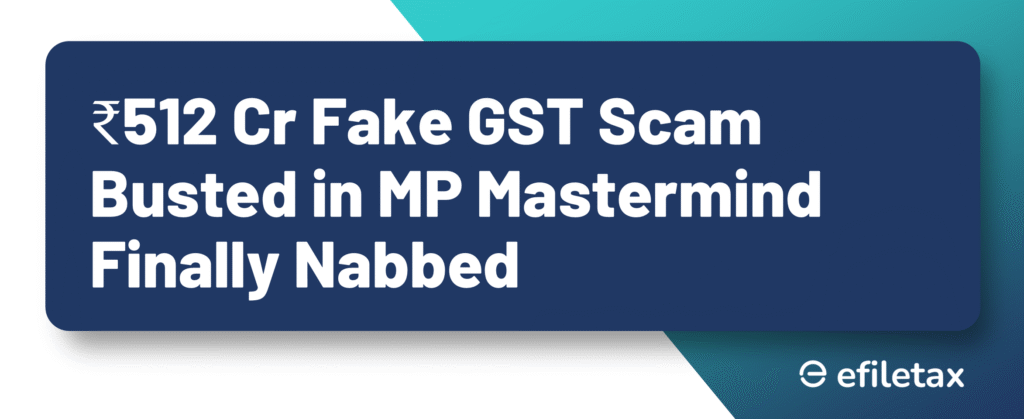
Fake GST Scam Busted in Madhya Pradesh: ₹512 Crore Fraud Exposed
A massive fake GST scam worth over ₹512 crore has been uncovered by the Directorate General of GST Intelligence (DGGI) in Madhya Pradesh.
This incident highlights the rising misuse of India’s GST system and the urgent need for awareness among honest taxpayers and businesses.
What Was the ₹512-Crore GST Scam About?
According to official sources (Press Release, DGGI Indore Zone), the scam involved:
- Creation of 92 fake firms across multiple states
- Issuance of fake invoices worth ₹512 crore
- Fraudulent ITC claims exceeding ₹92 crore
- Use of stolen or fake PANs, Aadhaar numbers, and bank accounts
- No actual movement of goods or provision of services
The suspect used software tools to generate e-invoices and manipulated the GSTN system to pass on fake credits to recipients.
How Do Fake GST Scams Work?
- Fake Entity Creation:
Shell companies are registered using forged KYC documents. - Bogus Billing:
Fake invoices are issued showing sale of goods/services. - Wrongful ITC Claim:
Buyer firms use these invoices to claim Input Tax Credit without actual purchases. - Money Trail Concealment:
- GST Refund Fraud:
In many cases, firms claim bogus GST refunds based on fake export transactions.
Legal Action & GST Provisions Involved
The DGGI has booked the accused under:
- Section 132 of the CGST Act, 2017 (Offences and Penalties)
- Section 69 (Power to Arrest)
- Case registered under non-bailable offence, considering the amount involved
Legal Tip: As per Section 132(1)(i), issuing invoices without actual supply of goods or services involving tax evasion over ₹5 crore is a cognizable and non-bailable offence.
Government Response: Tightening GST Compliance
Post this bust, authorities are:
- Conducting PAN-India audits of suspicious GST registrations
- Linking GSTINs with Aadhaar verification
- Using AI/ML tools by GSTN to flag irregularities
- Launching GST Amnesty Scheme 2025 to clean the system of fake credit buildup
Expert View:
“Fake GST scams not only hurt government revenue but distort market competition. Businesses must verify vendor authenticity on the GST Portal before entering transactions,” says a former CBIC officer.
What Can Taxpayers & Businesses Do to Stay Safe?
Here are some quick preventive measures:
✅ Use only verified GSTINs of suppliers
✅ Check supplier return filing status (GSTR-1, 3B)
✅ Don’t accept suspiciously large ITC claims
✅ Conduct KYC checks on new vendors
✅ Reconcile ITC with GSTR-2B regularly
Frequently Asked Questions (FAQs)
Q1. Is fake invoicing a criminal offence under GST?
Yes. Under Section 132 of CGST Act, fake invoicing involving ITC fraud is punishable with imprisonment up to 5 years.
Q2. Can a business lose its GST registration due to fake ITC claims?
Absolutely.
Q3. Where can I verify if a GSTIN is active?
Visit the official GST Portal and use the ‘Search Taxpayer’ option.
Summary
Authorities arrested the mastermind for issuing fake invoices and claiming fraudulent ITC. Businesses must verify vendors to avoid compliance risks.
Final Thoughts
This case is a serious reminder: Don’t get trapped by fake billing or shady vendors. The GSTN is now equipped with advanced tech tools, and fraud is being swiftly penalised.
If you’re unsure about your GST filings, input credit eligibility, or vendor validation — Efiletax can help.